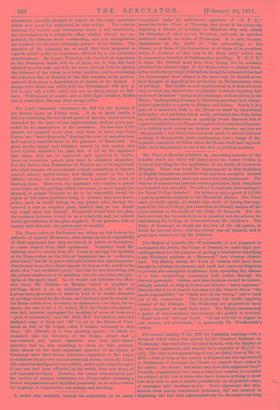A writer who probably intends his authorship to be easily
recognised, under the well-known signature of " E. P. B.," maintains in the Times of Thursday that there is no excuse for imputing a breach of privilege to Members who only attack the character of other- private Members, and only in speeches delivered outside the-walls of Parliament. It is only, he says, imputations on the credit of " the proceedings of the House, or of those of its Committees, or of those of its members acting in discharge of their duty to the House itself," which can be censured as breaches of Parliamentary privilege. If "E. P. B." is right, Mr. Disraeli must have been wrong, for he certainly- admitted the abstract right of the Home-rulers to shelter them- selves under the privilege of Members, though he intimated that had the Government' been abused in the same way, he should never have thought of appealing for protection to Parliamentary rules of privilege. But foolish as over-sensitiveness is, it does not seem easy to draw any distinct line of principle between imputing bad motives to Members " acting in the discharge of their duties to the House," and imputing the same to Members asserting their charac- teristic principles as a party in division and debate. Surely it is a part of a member's duty to the House to stand by his political principles ; and anything which really prevented him from doing so, would be as mischievous as anything which disposed him to report unfaithfully to the House the upsh ot of a Commitee of Inquiry. It is childish work crying out because your enemies say you are ' disreputable ;' but there does not seem much to choose between a charge of disreputable party combination, and a charge of dis- reputable execution of duties 'which the House itself had imposed. Still, thick-skinnedness is one of the first of political qualities.


































 Previous page
Previous page